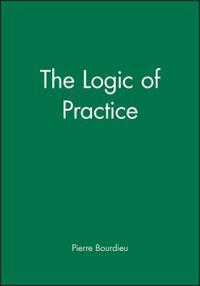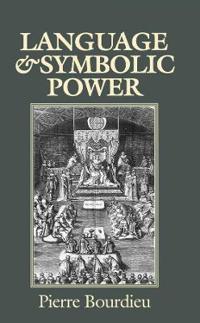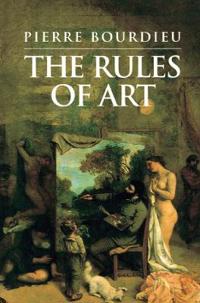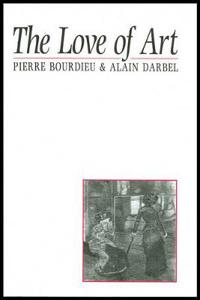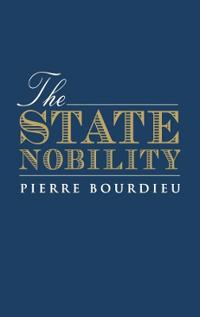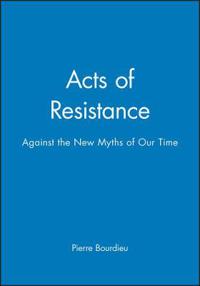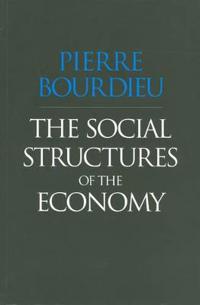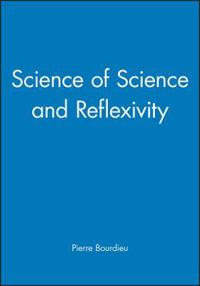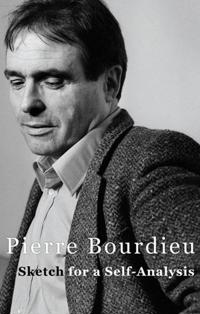The Logic of Practice (Häftad)
avPierre Bourdieu
ISBN: 9780745610153 - UTGIVEN: 199207Now available in paperback, this book offers a major statement of Bourdieua s theoretical approach, illustrating it with examples from anthropology. It will consolidate his reputation as one of the most original and exciting theorists in the social sciences today. Drawing on his own field work as we[...]
Language and symbolic power (Pocket)
avPierre Bourdieu
ISBN: 9780745610344 - UTGIVEN: 199212Examines the ways in which power is bolstered and extended by means of symbols. The book considers the importance of ritual in confirming institutions, looks at ways in which organs of power attempt to control discourse and explores the ways in which ideology can supplant reality.[...]
The Weight of the World (Häftad)
avPierre Bourdieu
ISBN: 9780745615936 - UTGIVEN: 199912This work presents a collection of stories from ordinary people expressing the state of society and the kinds of social exclusion, marginalization and impoverishment which are increasingly widespread.[...]
Practical Reason -On the Theory of Action (Häftad)
avPierre Bourdieu
ISBN: 9780745616254 - UTGIVEN: 199807The author clarifies and elaborates on the fundamental charcteristics of his theoretical approach, covering a wide range of substantive issues, from the formation of the modern state to the social conditions of political morality. Aimed at students and researchers in sociology, anthropology, politic[...]
The Political Ontology of Martin Heidegger (Häftad)
avPierre Bourdieu
ISBN: 9780745617145 - UTGIVEN: 199603This book is an important and timely contribution to the debate concerning the relation between Heideggera s philosophy and his political affiliations to Nazism. But it is more than that: it is also a study, by the leading sociologist in France today, of some of the institutional mechanisms involved[...]
Academic discourse - linguistic misunderstanding and professorial power (Pocket)
avPierre Bourdieu
ISBN: 9780745617169 - UTGIVEN: 199602Education depends crucially on language: knowledge and skills are taught largely through a process of linguistic exchange. But how much of the language used by teachers and professors is actually understood by students? To what extent does the social background of students affect their capacity to u[...]
The Rules of Art (Häftad)
avPierre Bourdieu
ISBN: 9780745617787 - UTGIVEN: 199605This is Bourdieua s long--awaited study of Flaubert and the formation of the modern literary field, it is an important contribution to the study of the social and historical conditions of literary works.[...]
Love of art - european art museums and their public (Pocket)
avPierre Bourdieu
ISBN: 9780745619149 - UTGIVEN: 199703By examining the social conditions of museum practices, this book shows that cultivated taste is not a natural gift but a socially inculcated disposition which is distributed unevenly, and which predisposes some to distinguish themselves through their love of art, while others are deprived of it.[...]
State nobility - elite schools in the field of power (Pocket)
avPierre Bourdieu
ISBN: 9780745620282 - UTGIVEN: 199802This work examines the distinctive forms of power - political, intellectual, bureaucratic and economic - by means of which contemporary societies are governed. It examines in detail the work of consecration which is carried out by the educational system, especially in France by the grandes ecoles.[...]
Pascalian meditations (Pocket)
avPierre Bourdieu
ISBN: 9780745620558 - UTGIVEN: 200001aeoA major new work by Bourdieu containing one of his most important and systematic theoretical statements. aeoThe book develops a powerful critique of scholarly reason, as a form of thought which is rooted in the special conditions of scholasticism.[...]
Acts of Resistance (Häftad)
avPierre Bourdieu
ISBN: 9780745622187 - UTGIVEN: 199810In his most explicitly political work to date, Pierre Bourdieu speaks out against the new myths of our time -- especially those associated with neo--liberalism -- and offers a passionate defence of the public interest. The withdrawal of the state from many areas of social life in recent years -- hou[...]
Male Domination (Häftad)
avPierre Bourdieu
ISBN: 9780745622651 - UTGIVEN: 200104Male domination is so anchored in our unconscious that we hardly perceive it any more. Pierre Bourdieu's ethnographic description of Kabyle society provides an extremely powerful instrument to dissolve taken-for-granted truths and explore the symbolic structures of this androcentric unconscious.[...]
The Social Structures of the Economy (Inbunden)
avPierre Bourdieu
ISBN: 9780745625393 - UTGIVEN: 2005-06-30The Social Structures of the Economy (Häftad)
avPierre Bourdieu
ISBN: 9780745625409 - UTGIVEN: 200504Much orthodox economic theory is based on assumptions which are treated as self--evident: supply and demand are regarded as independent entities, the individual is assumed to be a rational agent who knows his interests and how to make decisions corresponding to them, and so on.[...]
Science of Science and Reflexivity (Inbunden)
avPierre Bourdieu
ISBN: 9780745630595 - UTGIVEN: 2004-10One of the worlda s leading social thinkers, Bourdieua s work has become increasingly influential throughout the social sciences and humanities. In this new book he embarks on a sociological analysis of science and its legitimacy. Bourdieu argues that that emergence of the social sciences has had th[...]
Science of science and reflexivity (Pocket)
avPierre Bourdieu
ISBN: 9780745630601 - UTGIVEN: 200409* Pierre Bourdieu is one of the world's leading sociologists whose work has become increasingly influential throughout the social sciences and humanities. * A clear and accessible introduction to Bourdieu's views on science and scientific knowledge.[...]
Bachelors ball - the crisis of peasant society in bearn (Pocket)
avPierre Bourdieu
ISBN: 9780745630953 - UTGIVEN: 200805This book gives the reader sociological and anthropological insight into the interaction of occupation, social class and marriage and how these factors effect and affect smaller communities and provides a customarily deft analysis of the disintegration of rural communities and the nature of social c[...]
Pierre Bourdieu and Democratic Politics: The Mystery of Ministry (Inbunden)
avEditor:Löic Wacquant
ISBN: 9780745634876 - UTGIVEN: 2005-06-30Pierre Bourdieu and Democratic Politics: The Mystery of Ministry (Häftad)
avEditor:Löic Wacquant
ISBN: 9780745634883 - UTGIVEN: 2005-06-30Sketch for a self-analysis (Pocket)
avPierre Bourdieu
ISBN: 9780745635279 - UTGIVEN: 200806This is not an autobiography, Bourdieu said of this work but it reveals much of the hitherto implicit experience of his formative years, and gives insights into his relationships with Jean-Paul Sartre, Raymond Aron, Michel Foucault and many others, which deepen our understanding of his unique contri[...]
Algerian Sketches (Häftad)
avPierre Bourdieu
ISBN: 9780745646947 - UTGIVEN: 2013-09-30This unique volume brings together the first texts written by Bourdieu in the midst of the Algerian conflict, as well as later writings and interviews in which he returns to the topic of Algeria and the decisive role it played in the development of his work.[...]
Algerian Sketches (Häftad)
avPierre Bourdieu
ISBN: 9780745646954 - UTGIVEN: 2013-09-30This unique volume brings together the first texts written by Bourdieu in the midst of the Algerian conflict, as well as later writings and interviews in which he returns to the topic of Algeria and the decisive role it played in the development of his work.[...]
On Television (Häftad)
avPierre Bourdieu
ISBN: 9780745652160 - UTGIVEN: 201103A surprising bestseller when it was first published in France, this little book by Pierre Bourdieu offers a brilliant critique of television and its consequences for social and political life. Rather than simply denouncing television as a misrepresentation or trivialization of the social world, Bour[...]
The Sociologist and the Historian (Häftad)
avPierre Bourdieu, Roger Chartier
ISBN: 9780745679587 - UTGIVEN: 2014-12-31

